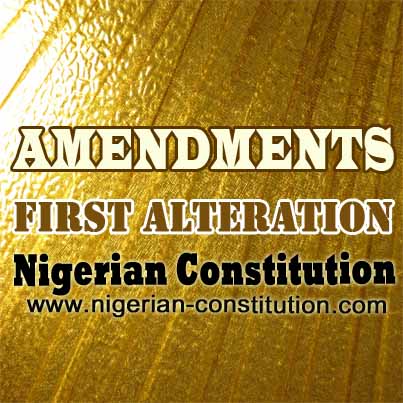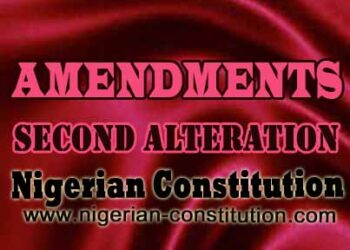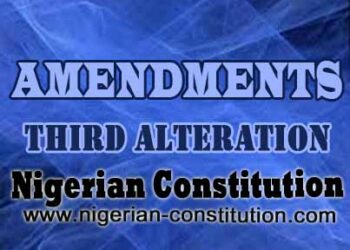CONSTITUTION OF THE FEDERAL REPUBLIC OF NIGERIA
(FIRST ALTERATION) ACT, 2010
ARRANGEMENT OF SECTIONS
SECTION:
- Alteration of the Constitution of the Federal Republic of Nigeria, 1999
- Alteration of Section 66
- Alteration of Section 69
- Alteration of Section 75
- Alteration of Section 76
- Alteration of Section 81
- Alteration of Section 84
- Alteration of Section 107
- Alteration of Section 110
- Alteration of Section 116
- Alteration of Section 132
- Alteration of Section 135
- Alteration of Section 137
- Substitution for Section 145
- Alteration of Section 156
- Alteration of Section 160
- Alteration of Section 178
- Alteration of Section 180
- Alteration of Section 182
- Substitution for Section 190
- Alteration of Section 200
- Substitution for Section 228 (a) and (b)
- Alteration of Section 229
- Alteration of Section 233
- Alteration of Section 239
- Alteration of Section 246
- Alteration of Section 251
- Alteration of Section 272
- Alteration of Section 285
- Alteration of Schedule to the Constitution.
- Citation.
CONSTITUTION OF THE FEDERAL REPUBLIC OF NIGERIA
(FIRST ALTERATION) ACT, 2010
A Bill
For
An Act to alter the provisions of the Constitution of the Federal Republic of Nigeria
1999; and for related matters.
| 16th July, 201O | Commencement | |
| ENACTED by the National Assembly of the Federal Republic of Nigeria — | ||
| 1. | The Constitution of the Federal Republic of Nigeria 1999 (in this Act referred to as “the Principal Act”) is altered as set out in this Act. | Alteration of the Constitution of the Federation Republic of Nigeria I999 |
| 2. | Section 66( 1) (h) of the Principal Act is deleted. | Alteration of section 66. |
| 3. | Section 69 of the Principal Act is altered, in paragraph (a), by inserting immediately after the word “member” in line 4, the words, “and which signatures are duly verified by the Independent National Electoral Commission”. | Alteration of section 6′). |
| 4. | Section 75 of the Principal Act is altered by deleting- (a) the expression, “the 1991 census of the population of Nigeria or”, in line 3; and (b) the words, “after the coming into force of the provisions of this part of this Chapter of this Constitution” immediately after the word “Assembly”, in lines 4 and 5. | |
| 5. | Section 76 of the Principal Act is altered – (a) in subsection (1), line 2, by inserting immediately after the word “Commission” the words, “in accordance with the Electoral Act”; (b) in subsection (2), by substituting for the words – (i) “sixty days before and not later than the date on which the House stands dissolved”, in lines 2 and 3, the words, “one hundred and fifty days and not later than one hundred and twenty days before”, (ii) “three months” in lines 3 and 4, the words, “ninety days”, and (iii) “one month” in line 4, the words, “thirty days”. | Alteration or section 76 |
| 6. | Section 81 of the Principal Act is altered by substituting for the existing subsection (3) a new subsection “(3)”- “(3) The amount standing to the credit of the – (a) Independent National Electoral Commission, (b) National Assembly, and (c) Judiciary, in the Consolidated Revenue Fund of the Federation shall be paid directly to the said bodies respectively; in the case of the Judiciary, such amount shall be paid to the National Judicial Council for disbursement to the heads of the courts established for the Federation and the States under section 6 of this Constitution.” | Alteration of section 81. |
| 7. | Section 84 of the Principal Act is altered by inserting immediately after the existing subsection (7) a new subsection “(8)” – “(8) The recurrent expenditure of the Independent National Electoral Commission, in addition to salaries and allowances of the Chairman and members, shall be a charge upon the Consolidated Revenue Fund of the Federation. “ | Alteration of” section 84 |
| 8. | Section 107 (1) (h) of the Principal Act is deleted. | Alteration of section 107. |
| 9. | Section 110 of the Principal Act is altered, in paragraph (a), by inserting immediately after the word “member” in line 4, the words “and which signatures are duly verified by the Independent National Electoral Commission”. | Alteration of section 110. |
| 10. | Section 116 of the Principal Act is altered – (a) in subsection (1), line 2, by inserting immediately after the word “Commission”, the words, “in accordance with the Electoral Act”; and (b) in subsection (2), by substituting for the words – (i) “sixty days before and not later than the date on which the House of Assembly stands dissolved”, in lines 2 and 3, the words, “one hundred and fifty days and not later than one hundred and twenty days before”, (ii) “three months” in line 4, the words, “ninety days”, and (iii) “one month” in line 4, the words, “thirty days”. | Alteration of section I 16. |
| 11. | Section 132 of the Principal Act is altered – (a) in subsection (1), line 2, by inserting immediately after the word, “Commission” the words, “in accordance with the Electoral Act”; and (b) in subsection (2), lines 1 and 2, by substituting for the words, “sixty days and not later than thirty”, the words, “one hundred and fifty days and not later than one hundred and twenty”. | Alteration or section 132. |
| 12. | Section 135 of the Principal Act is altered by inserting immediately after the existing subsection (2) a new subsection (2A)” – “(2A) In the determination of the four year term, where a re-run election has taken place and the person earlier sworn in wins the re-run election, the time spent in the office before the date the election was annulled, shall be taken into account.” | Alteration of section 135. |
| 13. | Section 137(1) (i) of the Principal Act is deleted. | Alteration of section 137. |
| 14. | Section 145 of the Principal Act is substituted for a new section” 145″ – “Acting President during temporary absence of President 145. (I) Whenever the President is proceeding on vacation or is otherwise unable to discharge the functions of his office, he shall transmit a written declaration to the President of the Senate and the Speaker of the House of Representatives to that effect, and until he transmits to them a written declaration to the contrary, the Vice President shall perform the functions of the President as Acting President. (2) In the event that the President is unable or fails to transmit the written declaration mentioned in subsection (1) of this section within 21 days, the National Assembly shall, by a resolution made by a simple majority of the vote of each House of the National Assembly, mandate the Vice President to perform the functions of the office of the President as Acting President until the President transmits a letter to the President of the Senate and Speaker of the House of Representatives that he is now available to resume his functions as President. “ | Substitution for section 145 |
| 15. | Section 156 of the Principal Act is altered in subsection (1) (a), line 2, by inserting immediately after the word “Representatives”, the words, “provided that a member of any of these bodies shall not be required to belong to a political party, and in the case of the Independent National Electoral Commission, he shall not be a member of a political party.” | Alteration of section 156. |
| 16. | Section 160 of the Principal Act is altered, in subsection (1), line 4, by inserting immediately after the word “functions”, the words, “provided that in the case of the Independent National Electoral Commission, its powers to make its own rules or otherwise regulate its own procedure shall not be subject to the approval or control of the President.” | Alteration of section 160. |
| 17. | Section 178 of the Principal Act is altered – (a) in subsection (1), line 2, by inserting immediately after the word, “Commission”, the words, “in accordance with the Electoral Act”; and (b) in subsection (2), line 2, by substituting for the words “sixty days and not later than thirty” , the words, “one hundred and fifty days and not later than one hundred and twenty”. | Alteration of section 178. |
| 18. | Section 180 of the Principal Act is altered by inserting immediately after the existing subsection (2) a new section “(2A)” – “(2A) In the determination of the four year term, where a re-run election has taken place and the person earlier sworn in wins the re-run election, the time spent in office before the date the election was annulled shall be taken into account”. | Alteration of section 180. |
| 19. | Section 182 (1) (i) of the Principal Act is deleted. | Alteration or section 182 |
| 20. | Section 190 of the Principal Act is substituted for a new section “190” – “Acting Governor during temporary absence of Governor 190. (1) Whenever the Governor is proceeding on vacation or is otherwise unable to discharge the functions of his office, he shall transmit a written declaration to the Speaker of the House of Assembly to that effect, and until he transmits to the Speaker of the House of Assembly a written declaration to the contrary, the Deputy Governor shall perform the functions of the Governor as Acting Governor. (2) In the event that the Governor is unable or fails to transmit the written declaration mentioned in subsection (1) of this section within 21 days, the House of Assembly shall, by a resolution made by a simple majority of the vote of the House, mandate the Deputy Governor to perform the functions of the office of the Governor as Acting Governor, until the Governor transmits a letter to the Speaker that he is now available to resume his functions as Governor.” | Substitution for section 190. |
| 21. | Section 200(1) (a), line 2, of the Principal Act is altered, by inserting immediately after the word “Assembly”, the words, “provided that a member of any of the said bodies shall not be required to belong to a political party and, in the case of the State Independent Electoral Commission, he shall not be a member of a political party”. | Alteration or section 200. |
| 22. | Section 228 (a) and (b) of the Principal Act is substituted for a new section “228” (a) and (b) – “Powers of the National Assembly with respect to political parties (a)guidelines and rules to ensure internal democracy within political parties, including making laws for the conduct of party primaries, party congresses and party conventions; and (b) the conferment on the Independent National Electoral Commission of powers as may appear to the National Assembly to be necessary or desirable for the purpose of enabling the Commission more effectively to ensure that political parties observe the practices of internal democracy, including the fair and transparent conduct of party primaries, party congresses and party conventions”. | Substitution for section 228 (a) and (b) |
| 23. | Section 229 of the Principal Act is altered by deleting the interpretation of the word “association” . | Alteration of section 229. |
| 24. | Section 233(2) of the Principal Act is altered in paragraph (e) by – (a) substituting for the word “or” after the word “President” in subparagraphs (i), (ii) and (iii), a comma – “,” ; and (b) inserting immediately after the word “Vice-President” in subparagraphs (i), (ii) and (iii), the words, “Governor or Deputy Governor”. | Alteration of section 233. |
| 25. | Section 239 of the Principal Act is altered by – (a) substituting for the word “or” after the word “President” in paragraphs (a), (b) and (c), a comma – “,”; and (b) inserting immediately after the word “Vice-President” in paragraphs (a), (b) and (c), the words “Governor or Deputy Governor”. | Alteration of section 239. |
| 26. | Section 246 of the Principal Act is altered – (a) in subsection (1) (b), by- (i) substituting for the words, “National Assembly Election Tribunals and Governorship and Legislative Houses Election Tribunals”, the words “National and State Houses of Assembly Election Tribunals”, (ii) deleting subparagraph (ii), and (iii) renumbering the paragraph appropriately; and (b) in subsection (3), line 2, by inserting immediately after the word “final”, the words, “provided that an interlocutory application may be decided during the delivery of judgment”. | Alteration of section 246. |
| 27. | Section 251 of the Principal Act is altered by inserting immediately after the existing subsection (3) a new subsection “(4)”- “(4) The Federal High Court shall have and exercise jurisdiction to determine any question as to whether the term of office or a seat of a member of the Senate or the House of Representatives has ceased or his seat has become vacant.” | Alteration or section 251. |
| 28. | Section 272 of the Principal Act is altered by inserting immediately after the existing subsection (2) a new subsection “(3)”- “(3) Subject to the provisions of section 251 and other provisions of this Constitution, the Federal High Court shall have jurisdiction to hear and determine the question as to whether the term of office of a member of the House of Assembly of a State, a Governor or Deputy Governor has ceased or become vacant”. | Alteration of section 272. |
| 29. | Section 285 of the Principal Act is altered – (a) by substituting for the existing subsection (1) a new subsection “(1)” – “(1) There shall be established for each State of the Federation and the Federal Capital Territory one or more election tribunals to be known as the National and State Houses of Assembly Election Tribunals which shall, to the exclusion of any Court or Tribunal, have original jurisdiction to hear and determine petitions as to whether- (a) any person has been validly elected as a member of the National Assembly; and (b) any person has been validly elected as member of the House of Assembly of a State”; (b) by deleting subsection (2); (c) in subsection (3), lines 1 and 2 by substituting for the words “National Assembly, Governorship and Legislative Houses Election Tribunals”, the words, “National and State Houses of Assembly Election Tribunals”; (d) in subsection (4), line 2 by substituting for the word, “two”, the word, “one”; (e) by inserting new subsections “(5)” -“(8)”- “(5) An election petition shall be filed within 21 days after the date of the declaration of result of the elections. (6) An election tribunal shall deliver its judgment in writing within 180 days from the date of the filing of the petition. (7) An appeal from a decision of an election tribunal or court shall be heard and disposed of within 60 days from the date of the delivery of judgment of the tribunal. (8) The Court in all appeals from election tribunal may adopt the practice of first giving its decision and reserving the reasons therefore to a later date.” | Alteration or section 285. |
| 30. | The following Schedules to the Constitution are altered – | Alteration of Schedule to the Constitution |
S E C O N D S C H E D U L E
Part I, Item 56 of the Second Schedule to the Constitution is altered by inserting
before the word “Regulation” the words, “Formation and”.
T H I R D S C H E D U L E
Item (F) of the Third Schedule to the Constitution is altered-
(a) by substituting for paragraph 14, a new paragraph “14”–
“14 (1) The Independent National Electoral Commission shall comprise
the following members-
(a) a chairman, who shall be the Chief Electoral
Commissioner; and
(b) twelve other members to be known as National Electoral
Commissioners.
(2) A member of the Commission shall-
(a) be non-partisan and a person of unquestionable integrity;
and
(b) be not less than 40 years of age in the case of the
Chairman and not less than 35 years of age in the case of
the National Commissioners.
(3) There shall be for each State of the Federation and the Federal
Capital Territory, Abuja, a Resident Electoral Commissioner who
shall-
(a) be appointed by the President subject to confirmation by the
Senate;
(b) be a person of unquestionable integrity and shall not be a
member of any political party; and
(c) not be less than 35 years of age”; and
(b) in paragraph (15) (c), line 2, by inserting immediately after the word “finances”,
the words, “conventions, congresses and party primaries”.
S I X T H S C H E D U L E
The Sixth Schedule to the Constitution is altered –
(a) by deleting, the word “Assembly” and inserting immediately after the word
“National” the words “and State’ Houses of Assembly Election Tribunals” in
Heading “A”;
(b) in paragraph 1(1), line 1, by deleting immediately after the word “National”
the word “Assembly”, and inserting the words, “and State Houses of Assembly
Ejection Tribunals”;
(c) in subparagraph (2), line 1, by substituting for the word “four”, the word
“two”; and
(d) by deleting-
(i) Heading “B”, and
(ii) paragraph 2(1), (2) and (3).
| 31. | This Act may be cited as the Constitution of the Federal Republic of Nigeria (First Alteration) Act, 2010 | Citation. |
I CERTIFY, IN ACCORDANCE WITH SECTION 2 (1) OF THE ACTS
AUTHENTICATION ACT, CAP. A2, LAWS OF THE FEDERATION OF NIGERIA
2004, THAT THIS IS A TRUE COPY OF THE BILL PASSED BY BOTH HOUSES OF
THE NATIONAL ASSEMBLY.
~
SALISU ABUBAKAR MAIKASUWA, mni
CLERK TO THE NATIONAL ASSEMBLY
6th DAY OF JANUARY, 2011
Schedule to the Constitution of the Federal Republic of Nigeria (First Alteration) Bill, 2010
| Short Title of the Bill | Long title of the Bill | Summary of the content of bill | Date passed by the Senate | Date passed by the House of Representatives |
| Constitution of the Federal Republic of Nigeria (First Alteration) Bill 2010 | An Act to alter the Constitution of the Federal Republic of Nigeria (First Alteration) Act 2010 among other things, to provide for the financial independence of the National Assembly and the Independent National Electoral Commission | The Bill seeks to alter the Constitution of the Federal Republic of Nigeria, 1999 and the Constitution of the Federal Republic of Nigeria (First Alteration) Act, 2010 among other things to provide for the financial independence of the National Assembly and the Independent National Electoral Commission | 2nd June, 2010 | 3rd June, 2010 |
I certify that this Bill has been carefully compared by me with the decision reached by the National and State Houses of Assembly and found by me to be true and correct decision of the Houses and is in accordance with the provisions of section 9(2) of the Constitution and the Acts Authentication Act Cap. A2, Laws of the Federation of Nigeria, 2004.
SALISU ABUBAKAR MAIKASUWA, mni
Clerk to the National Assembly
6th Day of January 2011
DR. GOODLUCK EBELE JONATHAN, GCFR
President of the Federal Republic of Nigeria
10th Day of January 2011
I ASSENT.







